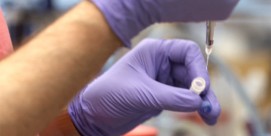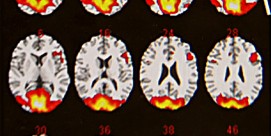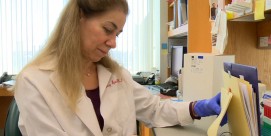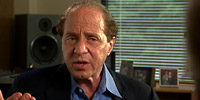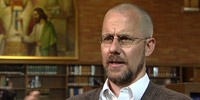In This Episode << SLIDE LEFT TO SEE ADDITIONAL SEGMENTS
Gregory Stock
Read Kim Lawton’s interview with Gregory Stock, CEO of Signum Biosciences and director of the Medicine, Technology, and Society Program at the UCLA School of Medicine:
Q: What kind of research are you doing?
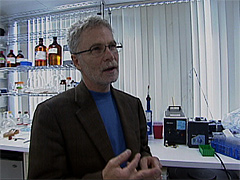 A: Here at Signum we are trying to do some things that are very interesting, in that the opening up of human biology and of biology and of life in general and understanding how it works at the most intimate of levels allows the possibility of going in and creating new kinds of therapeutics that are really designed, in some sense, but it also allows us to revisit the products of literally thousands of years of experimentation with herbal medicine, with various kinds of botanicals, and to understand the components of those and the agents therein that are really working and how they are affecting biology, because cells have been battling with one another since the beginning of life. And so all of the kinds of pharmaceutical developments, pharmaceutical possibilities that will affect major regulatory pathways in our bodies—most of them are out there. That’s why so many botanicals have been used as major drugs, if not as the origins or the starting points of additional, more advanced therapeutics. So we’re looking at Alzheimer’s. We have a new class of anti-inflammatories that can be used both in dermal and skin applications and potentially for a lot of diseases where inappropriate inflammation, either acute or chronic for long periods of time, are associated with particular diseases.
A: Here at Signum we are trying to do some things that are very interesting, in that the opening up of human biology and of biology and of life in general and understanding how it works at the most intimate of levels allows the possibility of going in and creating new kinds of therapeutics that are really designed, in some sense, but it also allows us to revisit the products of literally thousands of years of experimentation with herbal medicine, with various kinds of botanicals, and to understand the components of those and the agents therein that are really working and how they are affecting biology, because cells have been battling with one another since the beginning of life. And so all of the kinds of pharmaceutical developments, pharmaceutical possibilities that will affect major regulatory pathways in our bodies—most of them are out there. That’s why so many botanicals have been used as major drugs, if not as the origins or the starting points of additional, more advanced therapeutics. So we’re looking at Alzheimer’s. We have a new class of anti-inflammatories that can be used both in dermal and skin applications and potentially for a lot of diseases where inappropriate inflammation, either acute or chronic for long periods of time, are associated with particular diseases.
Q: What are you hoping some of the practical applications will be?
A: For instance, we’ve been looking at a key regulatory network that is called PB2A—protein phosphatase 2A—which removes phosphates from regulatory enzymes. There are many, many other enzymes that add phosphates, because those alter the activity of various regulatory enzymes. So this is kind of a master regulator. We have looked at botanicals that have active elements that affect that global regulation. An example of one of those is coffee. That has something in it that is affecting that strongly. Coffee has all sorts of epidemiology associated with health benefits. People who drink four or more cups of coffee a day—it doesn’t matter whether it is caffeinated or decaffeinated—have a reduction in Type 2 diabetes, or a reduced incidence of Type 2 diabetes, of about fifty percent. The same with Parkinson’s, although there it is more related to the caffeine. So if you can identify that compound, then you have the potential for a very strong preventive for Type 2 diabetes. There is a reduced incidence of Alzheimer’s. So coffee is actually a pretty good thing to be taking, and there are probably a number of therapeutics that are in both that and other botanicals that are in wide use, in fact such wide use that we don’t even think of them as herbals any more.
Q: What about genetic engineering?
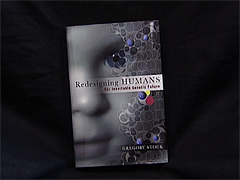 A: Another aspect of [this is] basically opening up biology, of understanding our workings at a very intimate level, at a deep enough level so that we can imagine not just understanding but actually tweaking it in a variety of ways, altering it, adjusting it. It’s clear that the long course, the trajectory of human investigation of ourselves is partially driven by curiosity, but the real program has been to understand ourselves well enough, and life well enough, that we can begin to intervene in those processes. We’re at the point where that’s beginning to be possible. You can see that in the hype associated with the human genome project—that we’re going to have all sorts of interventions that are based on our genetics. Those have not really come to pass, but it doesn’t mean that that larger vision of the possibilities of those kinds of interventions is false. We get a little bit exuberant about these things in the early stages, because you don’t see all the problems that are going to arise, all the complexities. So people who project forward five or ten or fifteen years are often way too aggressive. But if you go forward 25 or 50 or 75 years, it’s amazing how conservative people’s projections are, because they don’t see the breakthroughs that transform the landscape. And so many of the ethical issues that are arising now—it’s not so much with the interventions that are possible today, but the interventions that are quite plausible tomorrow, that we could actually begin to intervene in the processes of life, to alter ourselves. We’ve certainly used technology in very powerful ways. We’ve taken technology, and we’ve altered the world around us. In New York City, people are walking through these valleys of concrete and stainless steel and glass. This is not the stomping ground of our Pleistocene ancestors. Now technology is becoming so potent and so precise that we’re beginning to turn it back on ourselves. The implications are obviously profound, and they will really bring into question what it means to be a human being and how we differ from other life and from non-life as well, where we’re beginning to breathe a level of complexity into inorganic matter, into sand—silicone dioxide, this inert substance at our feet. We are breathing a level of complexity that rivals life itself. Nothing is ever going to be the same. So, naturally, it evokes questions of morality, of purpose, of who we are, of what we will become, which are the most contentious of issues.
A: Another aspect of [this is] basically opening up biology, of understanding our workings at a very intimate level, at a deep enough level so that we can imagine not just understanding but actually tweaking it in a variety of ways, altering it, adjusting it. It’s clear that the long course, the trajectory of human investigation of ourselves is partially driven by curiosity, but the real program has been to understand ourselves well enough, and life well enough, that we can begin to intervene in those processes. We’re at the point where that’s beginning to be possible. You can see that in the hype associated with the human genome project—that we’re going to have all sorts of interventions that are based on our genetics. Those have not really come to pass, but it doesn’t mean that that larger vision of the possibilities of those kinds of interventions is false. We get a little bit exuberant about these things in the early stages, because you don’t see all the problems that are going to arise, all the complexities. So people who project forward five or ten or fifteen years are often way too aggressive. But if you go forward 25 or 50 or 75 years, it’s amazing how conservative people’s projections are, because they don’t see the breakthroughs that transform the landscape. And so many of the ethical issues that are arising now—it’s not so much with the interventions that are possible today, but the interventions that are quite plausible tomorrow, that we could actually begin to intervene in the processes of life, to alter ourselves. We’ve certainly used technology in very powerful ways. We’ve taken technology, and we’ve altered the world around us. In New York City, people are walking through these valleys of concrete and stainless steel and glass. This is not the stomping ground of our Pleistocene ancestors. Now technology is becoming so potent and so precise that we’re beginning to turn it back on ourselves. The implications are obviously profound, and they will really bring into question what it means to be a human being and how we differ from other life and from non-life as well, where we’re beginning to breathe a level of complexity into inorganic matter, into sand—silicone dioxide, this inert substance at our feet. We are breathing a level of complexity that rivals life itself. Nothing is ever going to be the same. So, naturally, it evokes questions of morality, of purpose, of who we are, of what we will become, which are the most contentious of issues.
Q: A lot of people take a look at these things and jump ahead to what you call the sci-fi scenarios. How do you respond to people who leap to the worst-case scenario when they think about where this might lead?
A: I think that understanding where these possibilities will lead is very, very difficult, because we’re looking through this haze. We really can’t see where these things are going to go. We can make some strong statements in that the dynamic involved is very, very powerful. It’s not as though we have to seek out to do weird sorts of things. We’re engaged in funding tens of billions of dollars to try and understand biology so that we can develop new therapeutics, which everyone supports. Part of those understandings means that the bar is significantly lowered for doing other kinds of adjustments that many people would find more problematic. But I think the projections that we make that are often how we’re going to be afflicted by this knowledge demonstrate more about our own fears than they do about where we will actually go. The same thing on the other side, where we make fantastic predictions about the possibilities and all of the ills that will be removed from humanity and from society by this technological process. I think both of those are extreme, and they say a lot more about our hopes and fears than about where anything is going to go.
To me, it’s clear that this is a very robust development. I think that if you look at the risks and rewards involved, there are far more rewards involved than risks. I think that most of the issues—the real risks were things like “This is going to get out of hand and afflict us with plagues” and damages of that sort. I think that those are relatively unlikely. I think the real dangers of the technology are that we will use it in ways that are very negative. It’s not that somebody is going to try and do genetic screening on an embryo to try and enhance our lives, or to reduce disease. The things that are coming out of a sense of contributing, of adding to the quality of life, in one way or another—I don’t think that those are likely to be the things that are the most dangerous. The things that will be dangerous are to use these understandings to develop new diseases, to create terrorist weapons, things of that sort which, by and large, are not going to be constrained by regulation. So my feeling is that you have to have a certain amount of faith in our ability or the ability of future humans to make decisions about their lives that will be as sensible as the kinds of decisions that we are trying to make about our lives and about the immediate things that affect us. And for us to try and project forward into the distant future often—at least distant as far as the technologies that may be present—and try to control that in some way shows a real lack of respect for the ability of future humans—of our children, of their children—to make judgments that are in their interest, because the things that really are going to be problems are things that we don’t even begin to see now. I can virtually guarantee that. Anybody who looked at email and the Internet—who was worried about spam? No one. We just can’t see these sorts of things. And so, to me, it’s very spiritual to realize the immensity of the changes that are under way right now. They are so dramatic that if you were to push forward even a hundred years, it is mind-boggling, if technology continues to advance at the pace that it’s doing now or at an accelerated pace. And that seems quite likely. So where is this going to lead us? We don’t really know. To be engaged in this process which is changing the world around us, which is changing ourselves, which is life beginning to get control of its own processes and to act upon that information—to me, it’s awe-inspiring. It’s such a privilege to be alive at this instant in time and to be able to see these immense things, because in my view a million years from now—and I see this as a very robust development; I don’t see that we’re moving toward some sort of cliff—but that when future humans, whatever they are, whoever they are, look back on this moment, I think they’re going to look at it as this incredible instant in time when all of these things occurred, when we animated the inanimate, when we breathed life essentially into things that were previously inanimate, when we began to alter our own biology. The very foundation of what they are and who they are will have been established in this moment, in these hundred years. Here we are at this instant of departure, an evolutionary transition that is, in my view, as large as that when single-celled organisms started to come together to form multi-cellular organisms is happening right now. To me, it’s amazing to be able to watch it and to participate in it.
Q: When you use language like that it sounds almost religious. There is a God-like quality of breathing life into inanimate objects, no matter what religious tradition you’re talking about. Does that trouble you at all, human beings taking on that kind of power? What are some of the moral ramifications?
A: I look at it in a broader sense. I don’t put human beings outside of the processes of life and of nature. And so it’s inspiring that nature is achieving a level of complexity that can begin to reflect back upon itself and alter itself in conscious ways as well as in unconscious ways. Consciousness, for me, is a manifestation of complexity in biology. It’s an emergent property. So we’re at this transition between unconsciousness and consciousness and awareness and these levels of activity. So, to me, I’m not troubled by it at all. I like to be able to see it, to be able to have this evocation of these possibilities. And I’m sensible enough to see that it’s not me that’s seeing this; it’s this larger cluster of human activity, almost a super-organism that is able to observe and see all of these things. These possibilities are not coming from individuals; they’re coming from the huge clusterings of activity, where we have computers and scientific research that’s happening in thousands of laboratories all over the world that are cohering together, and that we—through telecommunications, our ability to integrate all sorts of diverse activities that would otherwise be beyond our ken—we can see all of these things. It almost feels like it’s us doing it, but we’re just a part of this larger process. So, to me, it’s why should we be troubled by the nature of the universe, because it’s not exactly what—people will go, “If I were designing things, I’d do it a little differently.” Well, you know, we’re in the middle of a world that is incredibly beautiful, awe-inspiring, that has been constructed with all of these possibilities and these dynamics that are now emerging and we get to see, and that we would sit back and then critique that and say, “Well, I find that very troubling that this is the world that exists”—it’s a conceit to me and a lack of an understanding of an acceptance that we are a part of this; we’re not back away from it, observing in a God-like sense.
Q: Philosopher Michael Sandel talks about mastery and control of humanity and nature. He suggests that’s what we’re seeking, and it is inappropriate.
A: I think that the notion of mastery and control is an unrealistic projection of the possibilities that are emerging, because for all of the advances that we make, we’re still in the midst of all this stuff. There’s one problem after another. It’s like you’re on a treadmill. You’re solving this, you’re solving that. It creates new problems. To me, the idea that we—whoever “we” is—are going to achieve some level of mastery over the environment, which is now increasingly complex and increasingly containing ourselves, it’s almost like we as a group, but we don’t act consciously like an individual. It’s all sorts of interplays and competitions and different varying possibilities that are in competition with one another. Look at all the noise that is associated with even these emergent possibilities in biotechnology. There’s argument, there’s disputation. It’s a process that is moving forward. To me, it feels very different from what we think of as mastery.
Q: What moral principles should be brought to bear, moving forward? You are a proponent of moving ahead full tilt, but what ethical and moral principles should be considered?
A: Let me step back in terms of the process. First of all, I think it’s unrealistic, if you just step back and look at what’s going on—the idea that we actually have the ability to say yes or no, this is going to happen or is not going to happen, is just silliness. This is going to move forward very, very aggressively. You can just see it in all of the energies that are being devoted towards furthering this process, although not necessarily acknowledging the powers that are involved in what is emerging. So it’s not a question about should we allow this to proceed or not. That’s a silly question, because obviously it’s going to move forward. To me, it’s about trying to do things and to guide the process and make it one that is in as much of alignment as we can with our values and the things that we cherish. There are many different answers to those questions from different groups of people and different individuals. Allowing, as well, acknowledging that there is profound turbulence and change that is occurring today, and best preparing ourselves to adjust and handle that change and realizing that values will change, that people will change. There was a lot of complaint about video games and about technology: Is this going to diminish our humanity in some sense? Who’s complaining about this stuff? It’s generally not the kids. If I look back at my great-grandparents and how they would respond to the world today, they wouldn’t be very happy with it. It would be, “It’s great, the things you have, but people don’t know their neighbors, families don’t stay together, you travel all over, people’s conversations at dinner are interrupted by a phone call”—all these sorts of things that are unfamiliar to them. And yet for me I think what a wonderful time to be alive! I wouldn’t want to go back to some previous simpler era with all of the positives and also all of the negatives associated with it. I think that if we look forward, our great-grandchildren are going to look in the same way at this period—to acknowledging that central to our humanity [are] the possibilities of change and redefining ourselves. It’s an acceptance, in many ways, of the inherent shifts and the difficulties that we will be dealing with, and just trying to do it in ways that are very positive, that feed the possibilities and the opportunities for people to develop their most human qualities, to realize themselves. I have a great deal of respect for individuals and the choices that they make. When they make choices about their families I think, by and large, they’re trying to do the right things. They’re the ones that suffer the consequences. In my view, the most damaging evils that are perpetrated upon us are through some abstract notion about good, where we’re willing to sacrifice individuals in the present for some great vision of an improved or perfect future. So, to me, it’s to avoid those sorts of things and to have some humility about our ability to see and to understand a time that we really can’t see very clearly, to allow these sorts of things to occur. To me, what we need is information. To act with wisdom doesn’t require going off and getting together a group of elders and saying how can we best handle this technology, because it comes from a place of ignorance. No one really understands what’s happening. What we need to do is—wisdom comes from knowledge that usually comes at a cost. It’s purchased, so not trying to stifle people’s ability to experiment and to try and do what they think will enhance our selves, in one way or another. By “enhance ourselves” I mean enhance our lives, make positive contributions to who we are and to how we interact with one another, because I think we will basically select what we find of value and will reject things that aren’t of value. So it protects ourselves in many ways. I think that putting that kind of stuff in place is the safest way ultimately to proceed; not to try and draw lines and say we should not cross this line because it feels so unfamiliar, so strange, so odd.
Q: You feel there is a moral responsibility to push ahead?
A: To be brave. We have possibilities before us that previous generations have only dreamed of. I’ve really dreamed of the idea of being able to alter human lifespan, of being able to prevent disease in profound ways, to enhance various qualities that we have. Who knows what will be of value and what won’t be? But I certainly feel that it would be a conceit for me to say that I know what we should do and what is of benefit for humanity as a whole and for the human enterprise. How crazy is that? My vision—and I think about these things all the time—and I actually think that the world that emerges fifty or a hundred years from now will be a place that I probably personally would be quite uncomfortable with because it’s quite unfamiliar. I would love to see it, but I don’t think it would be necessarily a place that would resonate with me in a variety of ways. I wouldn’t have said that twenty years ago. You see older individuals who seem out of touch with new developments and you say, “Oh that would never happen with me! I can stay in tune. I can keep in contact with this emerging edge of novelty.” It’s very, very difficult, because the things that we’re familiar with, that resonate with us, are things that are often displaced. The biggest changes occur when a generation dies and a new generation begins to be the dominant one. So it’s very odd. I don’t understand. If you take something that could be the most profound change that could occur, which would be substantial extension of the human lifespan—say we were to double human lifespan—you would think this would be radical in that it would change virtually every institution, it could change the way we relate to one another, it would seem to have very profound consequences. Yet, at the same time, it would be very conservative, because the tastes of those people would probably not alter. And so people would want to hold back changes that would otherwise have occurred when they died. So how do you decide how it all plays out? I don’t think you can; not in advance. So, to me, it’s let’s see where it goes. Make the best choices that we can for real problems that are here and now and ones that we can see in the near-term future. But beyond that, let’s be open to creating possibilities for others to make choices about. That’s the way I see it. To me, I find it sad that so many people, in the face of such wondrous things that are occurring, feel afflicted by a vision that we are destroying the world in some sense, which is, to me, almost criminal; that we take all of this bounty around us and that we hold it as an affliction, when anybody in a prior era would say, “What wondrous things!” We should be happy. We should be enjoying that there is all this bounty. Somebody can take an iPod and have all the world’s music at their beck and call in an instant. What an amazing thing! That we can talk with people across the globe, that we actually can be cured of many, many diseases—these are very wonderful things, and that’s why things don’t change that much, because we take it all for granted. Now with that as a baseline, we say, “But there’s still bad things in the world.” How horrible is that? To me, it’s amazing that we can even envision a place at this point where many, many of the age-old afflictions of humankind are potentially manageable. What a step that is! Of course, it doesn’t come quickly.
Q: Would it trouble you if some of the technology that’s used to help Alzheimer’s patients was also used to enhance the memory of a child, for example, by a parent who wants a child to do better in school?
A: No. If we could enhance our memories, to me that superficially seems desirable. It’s not clear that it would be of as much value as we want, or that it’s as necessary, since we have all sorts of electronic devices that are essentially memory-enhancers, but they’re adjuncts to ourselves rather than alterations of our own biologies. Is it troubling that we carry around devices that expand our memories dramatically? No, not for me. Any time there is a reduction in some disease process, in some affliction which we can all support, the possibility exists of other enhancements. There aren’t sharp lines, in my view, between enhancement and therapy. A perfect example of that is therapeutic enhancements where if you were to improve your immune system so that your immune system was twice as good as it had been for any previous human being; that’s an enhancement, but it’s also therapeutic in that it would protect you from a variety of diseases. I think there are all sorts of blurred lines in that realm. So I would look at individual applications. In the abstract, one might be able to say it seems like this would be desirable or undesirable, but probably you won’t really know until certain individuals try them. And what is desirable for one person might be considered to be undesirable for another. I tend to leave things up to individuals’ choices, to individuals’ making choices about themselves.
Q: Is there a point at which you think it goes beyond choice and things go too far?
A: Right now, with the sort of possibilities of altering, for example, the genetics of an embryo, we’re making choices in a position of being a guardian for a potential future life. There would be some things that probably most of us would agree would be not only great to do, but probably should be done—maybe protection against certain kinds of diseases. There are other things that we would say, “This is beyond the pale,” something that would diminish or damage that future life in ways that we understand. Then I think there will be a whole bunch of stuff that well-intentioned people would have significant differences of opinion about whether it is of benefit or not. I would say, for those things, who’s going to make those choices? I would tend to leave those choices to the individuals, or the guardians, who will be most affected by what happens—and will gain us knowledge about, in fact, whether they are of value or whether they are damaging. So I would tend not to give much weight to the arguments that people make about “This may be good for the individual, but for society as a whole it will be a negative,” because those arguments can be perverted in all sorts of ways. They’re almost impossible to argue against, and they really reflect about our rather opaque visions of the future. So the idea that this is going to change the relationships of individuals with one another, if an individual is allowed to enhance him or herself, then what are the third-degree-removed consequences of that? I think those are relatively meaningless.
Q: Michael Sandel, again, argues against altering the relationship between parent and child, where the child becomes almost a consumer product.
A: I think that those kinds of arguments about what the nature of the relationship between parent and child will be because of the use of technology are very difficult, and I think they tend to be quite false. When people talk about having children as becoming a manufacturing process almost, I don’t think they have a clue about what it is to have a child. You can talk about what one is doing in conception, but there’s a nine-month pregnancy that’s going on. It’s a messy process. Having a child that is growing up and that is forming under your wing—this is not a manufacturing process. Parents sometimes hope that it could be more predictable, but I just see that as very unlikely. Or sometimes arguments are made that if there were cloning, then the cloned individual would not see him or herself as being unique. They would not see themselves as an individual. That’s just empty conjecture, in my view. We certainly have the examples of clones—those are identical twins. Some of them are very tight relationships; some of them fight like cats and dogs. Individual personal relationships and the way we deal with the world are so various. I think to make those kinds of assumptions is silliness, in many ways. I don’t think that should be a major factor in setting policy, because if in fact those are negatives, then we’ll find out soon enough. And we should do so while only very few people are making such choices. The problem is that those are easy to conjure up, those kinds of scenarios, whereas the scenario of people [finding] this of value to their lives, in subtle ways, in diverse ways—who responds emotionally to that argument? I think biologically we are very equipped to respond to the technology gone wild, to great threats. That’s why all the Hollywood movies are about some technology that has escaped and almost destroys us and then we get them back in the box, or we get it back in the box, but not quite, for the sequel. So that’s something we really respond to, and for obvious reasons. It’s really good for our survival in environments where there are clear and immediate dangers. But in terms of putting credence into some abstract vision of what society will be and what our roles will be and what the values of that will be, what our values there will be, and how we’ll hold that, I think, are very, very false.
An example of the kinds of choices that we might make in the future, and that we can make in the present, are screening embryos to make choices about various kinds of traits—personality, temperament—or simply matters of gender, choosing a boy or a girl. So many of the arguments about—and there are many that oppose the idea of choosing the gender of a child. They usually point out the gender imbalances that exist in China, or possibly in India, where there aren’t even high technologies being employed there; it’s simply a matter of basically ultrasound and abortion. And they are very driven by the natures of those societies and the way they devalue boys and girls. It turns out that, in the developed world, of those who make gender selection there is a very slight preponderance of girl babies that are chosen. But they are almost equal. I ask myself who is being injured if a parent, for whatever reason, does not want to have a baby boy, or does not want to have a baby girl—and there are going to be a variety of reasons for that. Is it the child that is being damaged by being the gender of choice of that parent? I don’t think so. If that parent wants to have a baby girl instead of a baby boy, the girl isn’t being damaged. If anything is occurring, the child of the unwanted gender is going to be mistreated, in some way or other, or treated as of less value. So I don’t see that as a problem. If we allow that to occur, and we begin to see larger social problems such as occur in some countries, then we can deal with that. This isn’t something that is going to happen overnight. It takes many, many years for these changes to occur. So that’s an example of a very profound choice. What about temperament and personality? Who is being injured if parents have a predilection for certain types of personality and temperament, if they would be more comfortable or think they really would prefer to have a child who is a little more outgoing, or who is more introverted, or who is a little brighter, or whatever those traits are—who sleeps through the night, a very selfish choice. If there were any risk involved, very few parents would do those sorts of choices. And if there is no risk involved, which there really wouldn’t be for embryo screening, then I think that it’s very unlikely that there’s going to be anyone that’s really damaged by that, other than on a philosophical level, that we’d feel that parents are making choices about their children.
Q: So what if someone actually selected a baby that’s going to sleep through the night or be a little smarter?
A: In my view, the idea that someone—a prospective parent—would make some choice about the possible temperament and personality of their future offspring—which is natural that they would do—in a way that they can relate to more fully, that they think will resonate with more—I don’t see that anyone is going to be damaged by that. I think that a lot of choices, especially by parents who are making a choice about a first-time child, probably this will be one of the many falsities about their relationship with their child that they will see, because they’re going to love their child anyway. To me, I don’t see it as anything that is going to be damaging to anyone. And so I would allow people to proceed with those sorts of choices. And if one begins to have problems that emerge, I think it would be great to monitor the results of those sorts of choices that people made and what the consequences are—for the child, for the family—and we can begin to see whether there are problems. But how can you say that you would only allow those choices to be made for certain types of disabilities? Is a child with cystic fibrosis any less lovable? Is a child with trisomy [Down syndrome] any less lovable? So then we’re led into the uncomfortable position of saying we’re going to draw this line. If it’s about temperament and personality, we don’t want to go there. But as long as it’s just getting rid of a child with some infirmity, of some sort of potential health problem, then we’re comfortable with that. To me, I find that troubling, because then it really is saying that, at some level, prospective future humans are expendable. We’re making that as a societal statement. And at other levels, for other kinds of traits, they’re really not. So I just don’t see anything very damaging about that. I ask myself about all of these technologies.
To me, the question is if this were happening to me, how would I feel about it? When people talk about parents making choices about temperaments and personalities of their children, often people are thinking, “If my parents had been choosing, would I exist? Would I be one of the chosen?” This is a reasonable thing to question. But if one already existed, and you were told, “You know, your parents made a choice that they wanted to have somebody that was kind of outgoing like you are and kind of bright,” or whatever it is, “and how do you feel about that?,” you’re already kind of the winner of the lottery. Are you going to say, “No, I feel diminished, because my personality was, in some sense, the product of choice?” I don’t think so. If you look at children that are adopted and you ask them when their adoptive parents told them how they were chosen and they said, “Oh, we loved you more than any other child! We saw you and you had this about you or that about you, and we chose you actively because we wanted you”—that’s much preferable to “We just picked you at random. You were there and so we took you in.” So, to me, it’s not clear at all that that would be viewed as a diminution by a child. In any event, it’s easy to conflate knowledge about ourselves with choice, because the genetics revolution is making it so that we will soon know about ourselves at a very early age whatever genetics has to tell us about ourselves. So children are going to have to deal with this in the future. To me, it’s kind of natural that we would want to use this information in ways that we consider to be advantageous for our kids. We do it after they’re growing up. Parents have designs for their children that may be out of synch with who they really are.
I feel that life is really a gift, but not from anyone in particular. I think it’s amazing, but there’s a process involved. I feel very grateful for the opportunities I have, for who I am, for what I am. I’m not religious. I have a sense of the spirituality of the world and of the process by which the universe is unfolding, but I don’t believe in a deity that has any interest in my personally, or that was involved in the creation of this universe. And so to me it’s almost awe-inspiring that such a thing exists, rather than the easy answer: Oh, well, something created it as it is. Then who created that something? I see no evidence of such a deity externally, and I still feel a great sense of awe and wonder about who we are and about our place in the universe.

